
Social media is a wonder of our times. It is a space where people can express themselves freely. But it can also be harsh at times. Ask any celebrity who was on the wrong end of a Twitter backlash. Or ask brands that have countless silence brand memes in the comment section.
We will talk about the meme in detail. For now, let’s stick to the mixed bag of social media. It can do wonders for entrepreneurs and artists. But it can also force the biggest brands in the world to issue lengthy apologies. Simply put, social media can pick you up and put you down.
And that’s how powerful social media is today. As of 2021, there are 3.96 billion social media users worldwide. As you would expect, brands wanted to make the most of this power. They could now reach a worldwide audience. And so, they rushed to social media platforms to market themselves.
Some brands found quite a lot of success. And most brands got it wrong, to begin with. That’s when the meme “Silence, Brand!” and hashtag #silencebrand started to take shape. Let’s talk about the history of the meme, but first, let’s understand its meaning.
What is the silence brand meme?
The “Silence, Brand!” meme is a joke about how brands or companies on social media are trying to be socially engaged, relatable, friendly, or funny to get users' attention and promote themselves, their products, and services.
For many social media users, it seems inauthentic and, most of the time, annoying. And that’s when they post the "silence, brand!" meme, and the #silencebrand hashtag started to be used.
The meme tries to show companies that users see the possible false intentions behind the coolness, friendly tone, environmental concern, or social engagement. For them, brands are using these messages to promote themselves.
But what gave birth to the silence brand meme? Let’s start from the point when brands first arrived on social media.
And then will talk about lessons brands can learn from the entire saga. But let’s start from the start!
The Use Of Silence Brand Memes
"Silence, brand" is a meme that emerged from a screenshot of a Tumblr post where someone commented "Silence, brand" under an advertisement. This phrase has since been used in various contexts to humorously dismiss or criticize advertisements or branding efforts. Here are a few examples of how it’s been used:
- On Social Media: Someone might reply with "Silence, brand" to a sponsored post on Instagram or Twitter, indicating their disinterest or disdain for the advertisement.
- In Response to Promotional Emails: When receiving numerous promotional emails from a brand, someone might jokingly reply with "Silence, brand" to express their desire to unsubscribe or stop receiving such emails.
- During Corporate Presentations: In a meeting or presentation where a company is heavily promoting its products or services, someone might whisper "Silence, brand" to a friend to comment on the overwhelming branding.
- In Online Discussions: When a brand attempts to engage in a conversation on Reddit or a forum, users might respond with "Silence, brand" to mock the brand's intrusion into their community space.
- In Personal Conversations: Friends jokingly tell each other to "silence, brand" when one of them starts talking excessively about a particular brand or product.
Overall, the meme "Silence, brand" is a humorous way for people to poke fun at the omnipresence of advertising and branding in modern society.
The Arrival of Brands on Social Media
The arrival of brands on social media wasn’t much of an event. Some companies launched polls that got a reasonable response. Other companies ran mildly successful campaigns with the help of giveaways. But when it comes to tapping into the internet culture, they weren’t successful.
That was until Denny’s Tumblr account!
Denny’s Tumblr Account
Denny’s is an American restaurant chain that has over 1,700 branches worldwide. In April 2013, Denny’s created their official Tumblr account. And this account changed everything for brands on social media. There was something different in how Denny’s engaged with users on Tumblr.
They curated memes around their food items that people found hilarious. Also, they indulged in some friendly banter with other Tumblr users. And some of these interactions are famous to this day. Here’s one example from the vast Denny’s Tumblr collection:

As a result of such interactions and their memes, Denny’s Tumblr account was a hit. They were a success because of their social media team’s meme sense. And Denny’s had done what other brands were trying to do for years.
They had successfully tapped into the internet culture. And the social media audience loved every bit of it.
As you would expect, other brands wanted the same success. They begin hiring social media marketing teams. And that’s where some brands overdid it while others tried to mimic Denny’s tone and personality. That’s how it slowly builds towards the arrival of the silence brand meme.
Other Brands Jumping In
A lot of brands tried in vain to get Denny’s success. And there are some examples of brands embarrassing themselves.
Take Wendy’s failed attempt at tapping into the internet culture. Their 2015 commercial featured a character named “The Memer.”
Here’s a snapshot of that commercial that has since seen countless parodies:

Social media wasted no time in calling this commercial entirely out of touch. Viewers termed their commercials everything from dated to cringe-worthy. There are some other examples of brands missing the mark by miles on social media.
Brands Finally Succeeding
Brands started failing to mimic Denny’s success, and people thought it would never happen. The success of Denny’s Tumblr might be a one-off, they thought. The young social media audience will never let corporations be a part of the culture.
But soon, a social media revolution of sorts happened for these brands. McDonald’s, Burger King, Wendy’s, and Chick-fil-A stepped in.
Now, every other brand had a social media account with a quirky, relatable personality. They had everyday banters with one another. You could find clever comebacks and disses all over Twitter.
Here’s an example of Burger King replying to a tweet by Kanye West to diss their competitor McDonald’s:
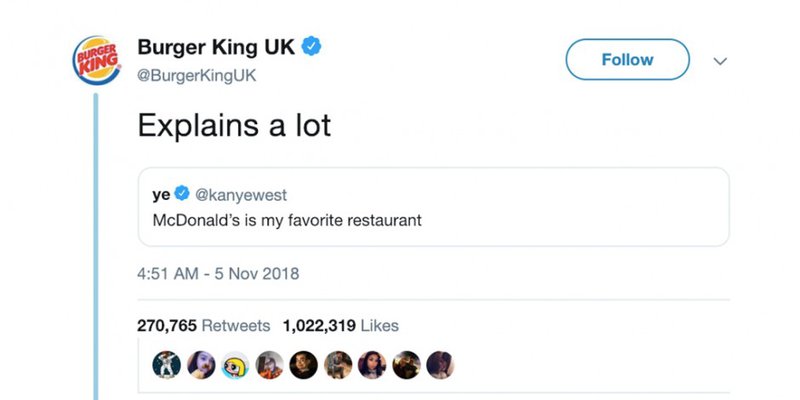
In the beginning, social media users loved it. After all, brands were acting just like they do on social media. The weird, quirky personality of these corporate accounts matched their own. As a result, they began sharing and retweeting.
To these brands, this was a cause of celebration. After years of failing to reach young audiences, they were finally successful. They begin enjoying every bit of it. Their social media marketers got pay raises and everything.
But soon, things began going out of hand. And that’s when the silence brand meme was born!
A Resounding Silence Brand!
Brands began gaining the publicity they wanted on social media. The weird, quirky personality of their accounts was working. And that’s when some of these brands began overdoing it.
To some social media users, their daily bantering was getting too much. Also, brands began commenting on everything on social media.
And that’s when we began seeing social media fails by companies. Here’s what DiGiorno Pizza tweeted with the #WhyIStayed. To make things clear, this hashtag was in defense of domestic abuse victims.
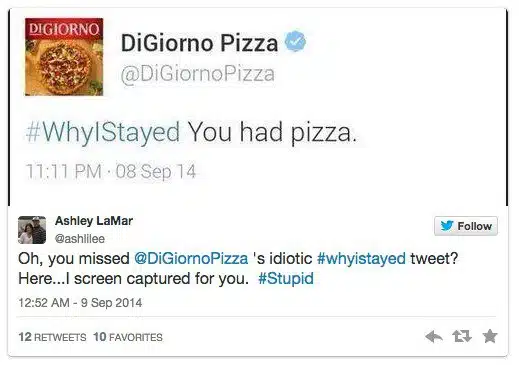
But these failures are not the only reason why the silence brand meme was born. There are some other reasons at play here.
Here is another one that just gave up. The brand promoting a product over a joke. The user added the “silence brand” and blocked McDonald's:
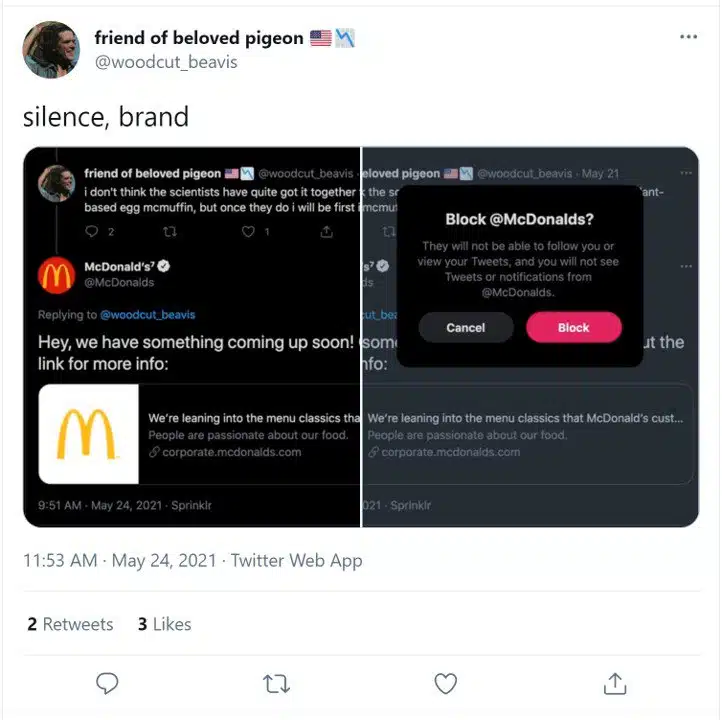
Some brands have decided to go with the flow. They even make jokes about this meme, and it seems to be a more honest way of talking to the users. Check out this example of BarkBox, which is a monthly gift box for dogs.
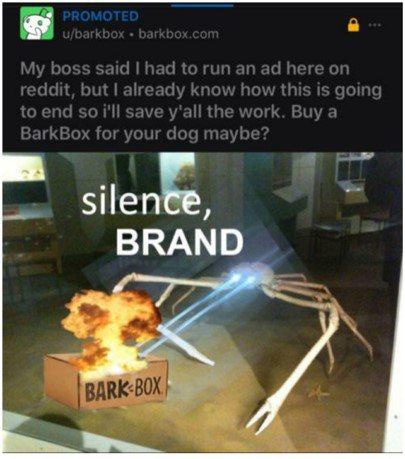
In this tweet, the user was pretty clear about what not to do:
What about this one, being ironic about the social causes defended by brands:

The Bottom Line
For a while, brands on Twitter were funny. But then, social media users began to see through the ruse. After all, what is the purpose behind all the comic banters and memes? What are brands looking to gain from the social media following? They want people to buy their products, that’s all.
After all, these brands are brands. They are not real people, but their social media accounts make them look like it. And that’s why all the humor and personality seem inauthentic.
In other words, it is another way to advertise their brand. It is a manipulative attempt at portraying a buddy image in front of the young social media audience. When in reality, they are corporations looking to make profits wherever they can. They’re not your buddies having fun on social media.
And when more and more people realized it, the silence brand meme was born. Here’s what the meme looks like:

The Meme
As you can see, the meme is a blue-eyed spider crab lasering a tiny creature. In effect, the spider crab is silencing that creature for good. And this meme wants brands on social media to go silent for good. The meme is a telling-off to brands that use social media to seem funny and relatable.
The “silence brand” meme did not shut up any brands, though. But brands and marketers should take essential lessons from it. So, what marketing lessons can you take from the biggest anti-marketing meme? Let’s find out!
Lessons From the Silence Brand Meme
Brands reacted differently to the silence brand meme. Some outright ignored it while others gave a reply. Some even twisted the meme to continue with their banter. Here’s how Funyuns did that:
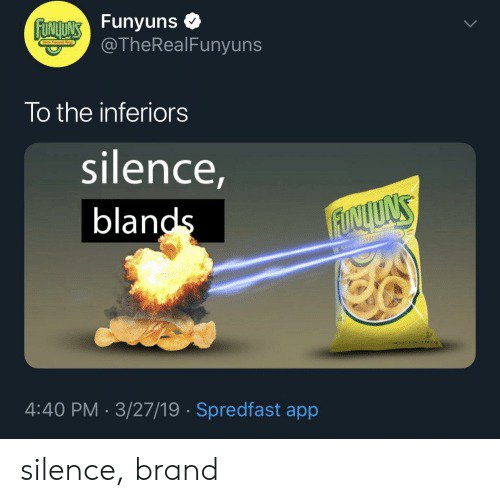
Brands can learn one crucial lesson from the silence brand meme. This lesson can help brands steer away from making blunders. So, here’s that one crucial lesson:
Silence Is Vital
Earlier, we saw a blunder made by a brand on social media. Why do brands make such mistakes?
It is because they want to comment on every issue. They want to jump on every meme bandwagon. In simple words, they overdo it with their tweets and banters. And they get a resounding silence brand in reply.
That’s why it is essential to understand how vital silence is in today’s day and age. Your brand doesn’t have to go completely silent as the meme wants. But you should also avoid being at it all the time.
Your brand doesn’t have anything to do with the winner of that reality show. And your brand doesn’t have to tweet about every controversy. Remember, sometimes it is better to stay silent. Social media and your account are going nowhere.
Instead, look to engage around topics relevant to your brand. You can be funny and relatable while talking about things you know. Why not speak on topics your brand has authority over? It will earn your brand the respect that most brands squander.
These brands pretend to be too woke! Others try to come off as too cool! And they want to comment on everything under the sun. The key is to avoid making such mistakes. Why? Because sometimes, silence is golden.
Based on the “Silence Brand” Meme, What Not to Do in Marketing?
The "Silence, brand" meme highlights a sentiment against intrusive or excessive marketing tactics. Here are some things not to do in marketing, inspired by the essence of the meme:
- Avoid Overpromotion:** Bombarding consumers with constant advertisements can lead to annoyance and pushback. Instead, focus on targeted and strategic marketing efforts that provide value to the audience.
- Don’t engage in other social conversations to clearly expose your product. Most people are not on social media to consume but to interact socially.
- Respect Social Media Spaces:** People use social media for personal interactions and entertainment, not to be inundated with ads. Respect the platform's community guidelines and engage authentically rather than aggressively promoting products.
- Don't engage in a social or environmental cause on social media just to look nice. If it’s not part of your culture and daily actions, don't sell yourself short with invented social campaigns. Create a culture of social responsibility and sustainable marketing before communicating it on social media.
- Don't Intrude on Conversations:** Interrupting organic conversations with blatant promotional messages can be perceived as spammy and insincere. Join discussions genuinely and contribute value rather than trying to forcefully insert marketing messages.
- Don’t fake to look like a teenager or a younger person if you have a corporate rule to follow and won’t talk like them in the end. It looks very artificial.
- Prioritize Quality over Quantity:** Instead of saturating every available advertising space, focus on creating high-quality content that resonates with your target audience. Quality content is more likely to be shared and remembered than generic advertisements. Don’t overdo it. Once you are successful on one post, don’t push the limits. People may like it one time, but not always.
- Listen to Feedback:** If consumers express displeasure or disinterest in marketing efforts, take their feedback seriously. Ignoring or dismissing feedback can damage brand reputation and alienate potential customers.
- Be Transparent:** Misleading or deceptive marketing practices can quickly erode trust and credibility. Be transparent about your products and services, and avoid making exaggerated claims or promises.
- Be honest, don’t push your product just because it's yours. Show the real benefits.
- Be careful with political opinions. You may lose half of your consumers.
- Respect Privacy:** In the age of data privacy concerns, be mindful of how you collect and use customer data. Obtain consent before collecting personal information, and prioritize customer privacy and security in all marketing initiatives.
By avoiding these pitfalls and respecting consumers' preferences and boundaries, marketers can build stronger connections with their audience and create more effective and sustainable marketing campaigns.
Learning From the Blunders
If you look for it, you will find countless social media failures by companies. Your brand might have made similar mistakes in the past. The key is to learn from the blunders. After all, brands need to change with time to survive.
So, not making the same mistakes is not enough. You also have to gain something from what went wrong. And when you get the lessons right, make sure you remember them. If you do that, your brand can steer away from the “silence brand” putdowns.

Ranu Kumari is a Professional Writer and a Marketing enthusiast who currently runs her own Marketing Consultancy, LatitudeBOX. She has written promotional articles for multiple brands and has published her work in Scopus indexed journals. She is passionate about expressing her thoughts and ideas to connect with her readers in a voice that they understand.

Just Here to Take MJ’s Popcorn
Stop this Madness!
Your style is really unique in comparison to other people I’ve read stuff from.
Thanks!
silence, corporate author